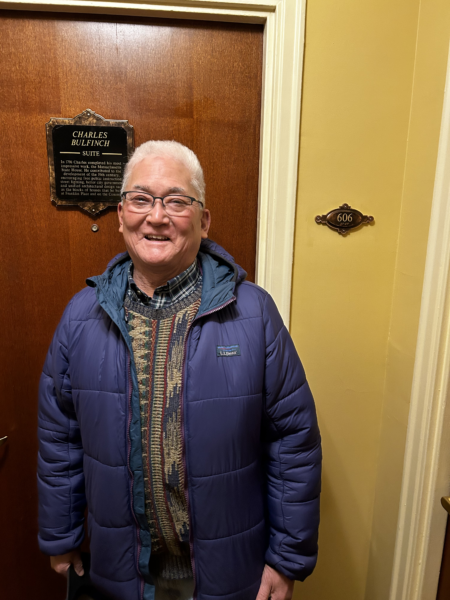James A. Hijiya is a professor of history emeritus at the University of Massachusetts Dartmouth. He lives in Dartmouth, Massachusetts, and has been a member since 1974.

James Hijiya
Alma maters: BA (English and American literature), Brown University, 1971; MA (history), Cornell University, 1974; PhD (history), Cornell University, 1977
Fields of interest: United States, American literature
Describe your career path. What led you to where you are today?
I switched from English to history because, in my senior year of college, I discovered that I wasn’t able to write a novel or a really good poem. Also, in order to pursue a PhD in English, I would not only have to learn either Greek or Latin, but also, to write about any novel or a poem, I would be obliged to read everything ever published about that novel or poem. I was unwilling to do that. As an undergraduate English major, I had indulged in “art appreciation,” just enjoying the works. However, when as a senior I took graduate-level seminars, I realized that what scholars of literature have to do is not only to savor the writings (wow!), but also to pulverize and analyze the now-insensate body of a poem or novel. I didn’t want to do that.
Also, while majoring in English, I took history courses from John Thomas and William McLoughlin, two wonderful teachers. I found that even though most history books were “secondary” like literary criticism (instead of consisting of primary sources), I could read them all day and be instructed and amused. Most works of literary criticism did not absorb me. So, I switched to history.
That switch was hard for me, however, and after one semester at Cornell I was ready to give up and go home. My adviser, Michael Kammen, persuaded me to stick it out for one more semester. He told me he liked a paper I had written for another professor’s seminar, in which I had received the unimpressive grade of B+, and he suggested a journal to which I might send it. So, I kept toiling in Ithaca, and by the time summer rolled around, I was feeling more comfortable and confident. That B+ seminar paper got published, and I was on my way as a historian.
Michael continued to help me for the next 40 years. As his own historical work broadened from American Colonial to constitutional to cultural, he took an interest in whatever I might happen to undertake, no matter how different it was from his own research. When, after retiring from teaching, I wrote a memoir, Michael suggested a literary magazine to which I might send a chapter of it. They published it.
I fell under the spell of Clio but could never devote myself exclusively to her. In graduate school I had a minor field in American literature; I still read fiction and poetry, often at night or on an airplane; I have published scholarly articles on Emily Dickinson and Nathaniel Hawthorne and a biography of a novelist named J. W. De Forest; I have smuggled literary conceits into such sober historical studies as an essay on J. Robert Oppenheimer; and my self-published memoir draws on models from Melville to Montaigne. I can never forget what I loved as an English major.
What projects are you currently working on?
I am trying to find somebody who will publish an essay that is too long for an article and too short for a book. It is titled “Four Square: A Taxonomy of Political Ideologies.” In it I provide simple, clear definitions of what I consider the four ideologies dominant today: liberalism, conservatism, socialism, and social darwinism. That last category includes most varieties of libertarianism and neoliberalism. The essay is ambitious, attempting to define the terms for the analysis of political thought.
This adventure in political theory began fifteen years ago as part of the introduction to a book called The Liberal Empire: A Partial History of the Whole United States. I call it my end-of-life project because at the rate I am going, I would have to reach the age of 115 before I would finish the first draft. In the unlikely event that I somehow finish the book, nobody will ever publish it. Nevertheless, I am undeterred. The research and writing keep me amused. I have written 200 pages and have not yet gotten to Columbus. I am trying to cover the whole country, including Puerto Rico and especially Hawaii. I consider the predominant ideology of the nation to be liberalism, but I provide my own, peculiar (but, I think, sensible and useful) definition of the term. Instead of writing about what most historians consider essential, I write about what interests me, like indigenous games (surfing!) and domestic architecture.
Have your interests evolved since graduation? If so, how?
I was lucky enough to teach at a university that allowed me to teach anything I wanted. I was hired to teach the Civil War but quickly switched to other fields: colonial, revolution, Age of Jackson, 1960s, Native American, nuclear arms race, US and Latin America, teaching American history, and others. I do not specialize.
What’s the most fascinating thing you’ve ever found at the archives or while doing research?
I discovered a typescript memoir that was dynamite, but I could not use it in my book because doing so would hurt its author. I came to believe that even scholars ought to be kind.
Is there an article, book, movie, blog etc. that you could recommend to fellow AHA members?
The Secret Agent by Joseph Conrad. My favorite scene from the novel is when an anarchist, Comrade Ossipon, tells a man called the Professor (who provides him with a bomb intended to blow up the Greenwich Observatory, the center of time and space and therefore the perfect target for an anarchist) that “‘Mankind wants to live—to live!’ ‘Mankind,’ asserted the Professor with a self-confident glitter of his iron-rimmed spectacles, ‘does not know what it wants.’” My study of history suggests to me that the Professor is right. About this, anyway.
What do you value most about the history discipline?
The fact that it is not really a discipline. Anybody can do it, though not everybody can do it well.
AHA members are involved in all fields of history, with wide-ranging specializations, interests, and areas of employment. To recognize our talented and eclectic membership, Perspectives Daily features a regular AHA Member Spotlight series.
This work is licensed under a Creative Commons Attribution-NonCommercial-NoDerivatives 4.0 International License. Attribution must provide author name, article title, Perspectives on History, date of publication, and a link to this page. This license applies only to the article, not to text or images used here by permission.

